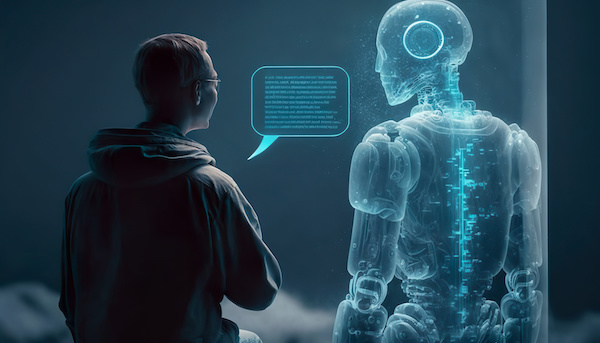Published on
The Evolution of Marketing in the Wake of AI
Lauren Benning-Williams | Director of Marketing and Communications, The George Washington University

Marketing tactics have evolved over the past couple of years in wake of digital transformation, but it doesn’t end there. As AI becomes increasingly popular, higher ed marketers must shift their thinking in how they approach marketing to modern-day learners. In this interview, Lauren Benning-Williams discusses how higher ed marketing as evolved in recent years, how to leverage AI and embrace it rather than fear it.
The EvoLLLution (Evo): How are you seeing higher ed’s marketing landscape evolve as generative AI becomes increasingly popular?
Lauren Benning-Williams (LBW): From the higher ed marketing lens, I’m seeing people leverage AI’s capacities and capabilities. We’ve evolved into an instantaneous society. Everyone wants things right now and to get feedback immediately. So, AI allows us to have some of that data in real time in a way we didn’t have before.
With that, AI gives marketers like me the power to provide real-time information to deans and department chairs on how their content is operating. They can instantly see how well an ad is being received by their targeted audience. That gives us the opportunity to take the guessing out of marketing planning, so we can create more successful and robust campaigns.
Evo: How can you leverage AI to be more impactful and effective when it comes to marketing in higher ed?
LBW: First, look at how you define success. AI allows us to personalize marketing solutions. Before, the dominant perspective was that everyone should know who we are. Now, it’s quality over quantity. So, AI has pushed us into this methodology when planning—focusing on the personal aspects and targeting the people who are interested in us and will engage with what we offer. This approach improves our overall engagement experience.
The key to successful and effective marketing is crafting the right message for the right audience. If success for you is ROI, then you want to make sure you’re targeting the right people. And AI allows you to personalize your message while improving engagement. You’re not wasting time and resources when you drill down to your targeted audience and platform.
Evo: What are the challenges when it comes to incorporating AI into marketing efforts?
LBW: The George Washington School of Engineering is one of the leading schools when it comes trustworthy AI—the idea of developing and designing artificial intelligence that people can trust. I’m supporting faculty member David Broniatowski, who is leading research around this. There’s been some testing around the ethics of things like ChatGPT. There have been times when it has inserted completely false information. So, even though it’s a helpful tool, we still have to monitor it.
My concern is for marketers who rely too heavily on ChatGPT. Those who see it as a first solution rather than a support solution. Another concern is the socioeconomic barriers its use can create for those who can’t afford the premium tools. Smaller institutions may not have the same as the larger schools. The final concern is the adoption of AI as a primary tool. We don’t want to run people out of work. We first need to understand these tools and become experts, so they become assistant tools.
Evo: What are some best practices institutions can use to embrace AI if they happen to be afraid or concern about it?
LBW: The first best practice is to learn about it. Do your research to understand what’s out there and talk to colleagues and peers about it. From there, you can find opportunities for your institution. Second, talk to faculty researching AI. Use those resources and ask them questions. If you don’t have faculty focused on this topic, then reach out to faculties surrounding you for lunch-and-learns. The third step is to take a step back and understand your institution’s needs. Look at your capacity and resources to see what’s doable. Are there any gaps where some of these AI tools can assist you?
As a marketer, we can’t really afford to make mistakes like putting the wrong content somewhere. So, make sure you have the right training in place. Putting together a policy booklet with your developer and central team is important to ensure everyone at your institution understands these new systems and tools and how to use them. They’re just basic guidelines.
Evo: What are some potential impacts we can anticipate as a result of AI?
LBW: AI will enhance the student experience and provide more tailored content. It’ll help us predict student behavior—their wants and needs—which we can use to create better solutions.
From an academic perspective, AI can support and elevate some of that education learning experience for students. It’ll help students who do quantitative research, including data. It also helps students focused on human-centered research.
So, AI will certainly enhance the student experience. It’ll provide us with more predictive information for our students and ultimately make things better.
Evo: Is there anything you’d like to add?
LBW: Technology, specifically AI, continues to change, but people will continue to have jobs. When the first supercomputer came out, I’m sure everyone was afraid it would put them all out of work, but that’s not what happened. Instead, we had an entirely new workforce. And I argue that the same will happen here—we’ll have a new workforce around AI. Our next generation of marketing and communication higher ed people will be experts in this.
You’ll always need someone who is responsible for in-person interaction and engagement. We’re educating our minds and trying to impact our communities. People will always be at the center of it. It’s just a matter of figuring out where we fit in.
Author Perspective: Administrator



